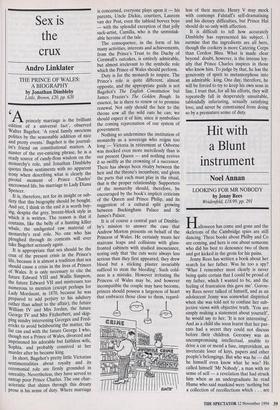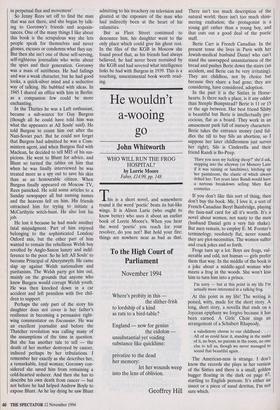Hit with a Blunt instrument
Noel Annan
LOOKING FOR MR NOBODY by Jenny Rees Weidenfeld, L18.99, pp. 291 Halloween has come and gone and the skeletons of the Cambridge spies are still dancing. Three books about Philby and Co are coming, and here is one about someone who did his best to denounce two of them and got kicked in the groin for his pains.
Jenny Rees has written a book about her search for her father. Was he too a spy? `What I remember most clearly is never being quite certain that I could be proud of my father, which I wanted to be, and the feeling of frustration this gave me'. Goron- wy Rees never talked of himself, and as an adolescent Jenny was somewhat dispirited when she was told not to confuse her sub- jective views with objective truth. 'You are simply making a statement about yourself, he would say to her. 'It is not interesting'. And as a child she soon learnt that her par- ents had a secret they could not discuss before their children. Goronwy was an uncompromising intellectual, unable to drive a car or mend a fuse, improvident, an inveterate loser of keys, papers and other people's belongings. But who was he — did he himself even know what he was? He called himself 'Mr Nobody', a man with no sense of self — a revelation that had struck him when as an undergraduate he read Hume who said mankind were 'nothing but a collection of recollections which . . . are in perpetual flux and movement'.
So Jenny Rees set off to find the man that was not there, and she began by talk- ing to Goronwy's friends and acquain- tances. One of the many things I like about this book is the scrupulous way she lets people speak for themselves and never glosses, excuses or condemns what they say. But then she isn't one of those self-serving, self-righteous journalists who write about the spies and their generation. Goronwy was a mass of antitheses. He had failings and was a weak character, but he had good looks, a quick-silver mind and a seductive way of talking. He bubbled with ideas. In 1945 I shared an office with him in Berlin: as a companion few could be more enchanting.
In the Thirties he was a Left enthusiast, became a sub-source for Guy Burgess (though all he could have told him was what the appeasers at All Souls' said). He told Burgess to count him out after the Nazi-Soviet pact. But he could not forget that Burgess had admitted he was a Corn- mintem agent, and when Burgess fled with Maclean, he decided to tell MI5 of his sus- picions. He went to Blunt for advice, and Blunt so turned the tables on him that when he was finally interviewed he was treated more as a spy out to save his skin than as an honourable citizen. When Burgess finally appeared on Moscow TV, Rees panicked. He sold some articles to a Sunday newspaper all but naming names and the heavens fell on him. His friends ostracised him for trying to initiate a McCarthyite witch-hunt. He also lost his job.
He lost it because he had made another fatal misjudgment. Part of him enjoyed belonging to the sophisticated London/ Oxford axis, but the other part of him wanted to remain the rebellious Welsh boy revolted by Anglo-Saxon luxury and indif- ference to the poor. So he left All Souls' to become Principal of Aberystwyth. He came slap up against Welsh nationalism and puritanism. The Welsh party got him out, mainly on the grounds that anyone who knew Burgess would corrupt Welsh youth. He was then knocked down in a car accident and left penniless with five chil- dren to support.
Perhaps the only part of the story his daughter does not cover is her father's resilience in becoming a persuasive right- wing commentator on Encounter. He was an excellent journalist and before the Thatcher revolution was calling many of the assumptions of the time in question. But she has another tale to tell — the death of her mother destroyed by cancer, induced perhaps by her tribulations. I remember her exactly as she describes her, a remarkable, loyal woman; Goronwy con- sidered she saved him from remaining a cold-hearted seducer. And then she has to describe his own death from cancer — but not before he had helped Andrew Boyle to expose Blunt. As he lay dying he saw Blunt admitting to his treachery on television and gloated at the exposure of the man who had indirectly been at the heart of his calamities.
But as Fleet Street continued to denounce him, his daughter went to the only place which could give his ghost rest. In the files of the KGB in Moscow she found proof that, as his friends had always believed, he had never been recruited by the KGB and had severed what intelligence links he had with Burgess in 1939. This is a touching, unsentimental book worth read- ing.



































































 Previous page
Previous page